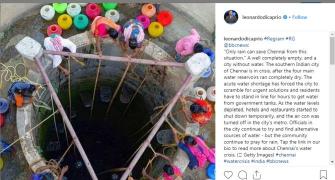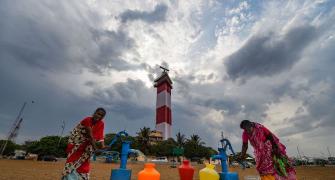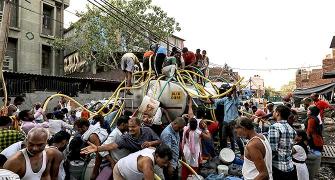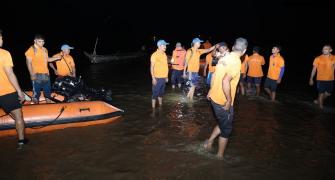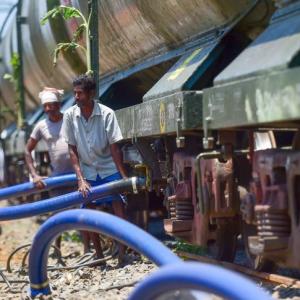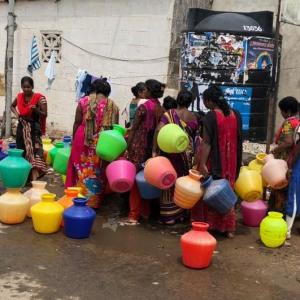A Ganesh Nadar/Rediff.com tracks the train from Jolarpettai carrying its precious cargo.

In less than a week since it began its run, the Jolarpettai to Chennai water train, carrying its precious liquid cargo to Tamil Nadu's parched capital city, has been increased to two rakes a day.
With each rake carrying 2.5 million litres, this hardly suffices to quench the city's thirst.
The government wants to increase the service to four runs a day, but given the 200-odd km separating the two cities, and the loading/unloading time at each end, that seems too ambitious a number.
The railways, however, is confident it can manage three runs a day.
The water train service may be little more than cosmetic. Chennai, the sixth largest city in India, is facing an unprecedented water crisis and the government is doing what it can to address the people's needs.
The city needs 830 mld (million litres per day) of water. The Chennai Metropolitan Water Supply and Sewerage Board has been supplying 525 mld for the past one month.
In its bid to bridge the shortfall of 300 mld, it has arranged for another 10MLD from Jolarpettai in Vellore district through the water trains.
Vellore is fed through the combined drinking water supply scheme which provides water from the Cauvery at Thottilpatti village downstream from the Stanley reservoir (Mettur dam) and upstream from the Checkanur barrage in Salem district.
Vellore is entitled to 160 mld under this scheme, but draws only 120 mld. Thus, the 10MLD for Chennai will not affect the supply to Vellore, nor does it, as is feared, deprive the locals of their share of water.

At Jolarpettai railway station pipes have been laid from the nearest tank to the railway yard. A huge pipe has been installed along the railway track, and the pipe has 50 outlets on top from which large green water hoses hang loose.
Jolarpettai is an important railway junction with its own yard and workshop. A petrol rake is in the yard awaiting repair work.
The Chennai water express has just arrived and makes its way past the railway station gently into the yard, the train coaxed into halting such that the water tanks are perfectly aligned with the water outlets.
As the motorman gets down and locks his cabin, a railway trackman places a red flag across the track in front of the engine to let everyone know that the train will not move for a while.
As if on cue, three young men rush in, carrying tall plastic pipes from which a long wire hangs along with a hook on top. They walk to predetermined electrical poles along the train.
One of them receives a call on his mobile phone and he identifies exactly which pole he is next to. "The power supply has been switched off in this sector," he says and proceeds to hook the wire to the overhead power lines above the track. The other end of the wire is tied to the pole.
"I am earthing the overhead power lines. In case there is any residual charge in them, it is a 600 volts supply and if the workers loading the water touches the line by mistake, it will be fatal," he explains.
The earthing is removed once the water is filled and the workers alight from the wagons. Power supply is restored after that, enabling the train to move out.
In the meantime, another set of railway employees checks the water outlets at the bottom of the tanks, making sure they are all shut. A few men climb on the tanks, quite close to the overhead wires and you realise how dangerous it could be.
Men on the ground throw up the hoses to be attached to the tanks on top. They walk across the train as the work continues with clockwork precision.
Once all the hoses are attached, the workers start filling the tanks one a time from one end to the other.
"We don't fill it to the brim, it has a capacity of 54,000 litres, we fill about 50,000 litres in every tank." Each train has 50 tanks.
Filling up the tanks is time-consuming, taking around six to seven hours, time enough for the workers to break for lunch. The time taken to fill the whole train varies from 6 to 7 hours depending on the water pressure.
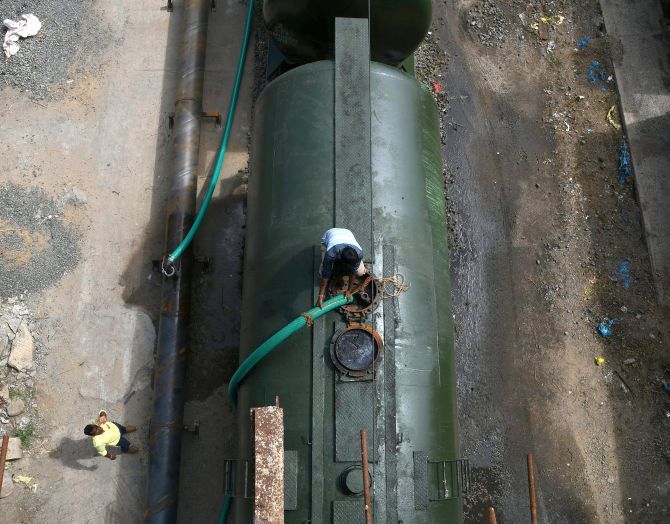
66 trains operate daily between Chennai and Jolarpettai, and the water train has to be accommodated among them, not delaying any of the regular passenger trains.
The 214 km journey is covered by the other trains in four hours, but the water train takes up to six hours to reach its destination, Villivakkam in Chennai.
The water train's engine proudly proclaims 'Chennai Water Express' on a white cloth banner, and there are stickers all over the train proclaiming 'Chennai Metrowater'.
Each train costs the water supply board Rs 840,000. The state government has sanctioned Rs 660 million for this uusual way to transport water.
At Villivakkam the water train is received at the Integral Coach Factory yard which is at a little distance from the main railway station.
Here too, the water board has laid a large pipe, but this one is underground and along the track.
Here too, big green hoses pop out of the ground at a regular distance and once the train arrives it is again aligned perfectly and the hoses attached by the waiting gang men.
"We empty one tank at a time, otherwise the pipes will overflow," a worker says.
Water from the train flows directly to a treatment plant in Kilpauk from where it is supplied to homes in Chennai.
2.5 million litres may seem like a mere drop in the face of Chennai's gargantuan needs, but given the dimension of the water woes facing the city, you realise that the government is making every drop count.

